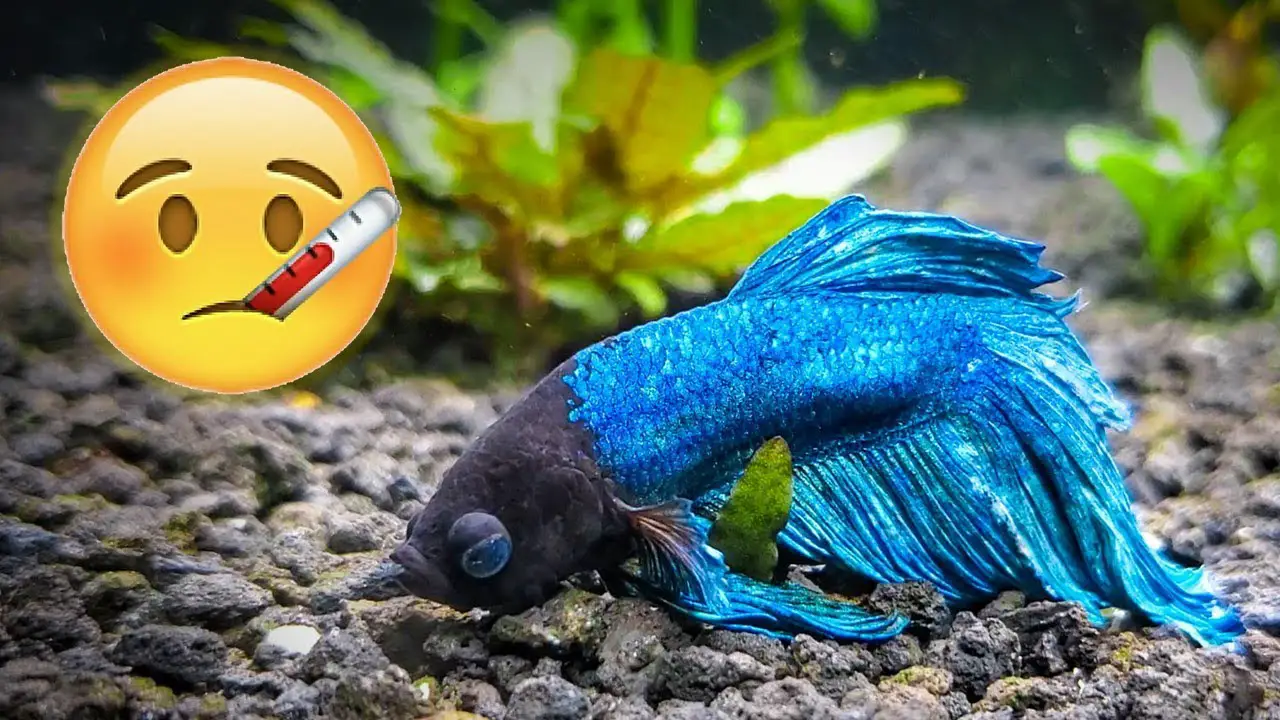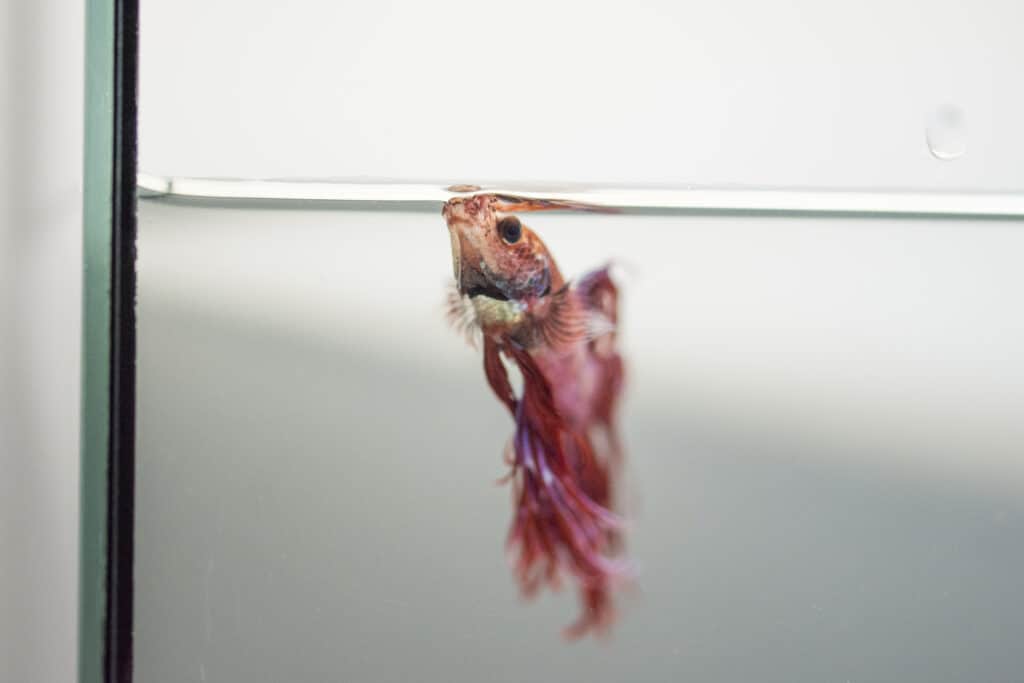Betta fish, also known as Siamese fighting fish, are popular pets among fish enthusiasts. However, like any living creature, they eventually pass away. It’s important to know what to expect when your betta fish dies, including what they will look like.
When betta fish die, they typically float to the top of the water and remain there. Their body may become pale and their eyes cloudy. It’s also common for their fins to become clamped, which means they are held close to their body. Understanding these signs can help you properly care for your betta fish, even in their final moments.
When a betta fish dies, it will generally float to the surface of the water and lay there. Its body will become stiff, and its color may fade. In some cases, the fins may become clamped or stick to the body. If the fish has been dead for a while, it may develop a white, fuzzy mold on its body. It’s important to remove the dead fish from the tank immediately to prevent any harmful bacteria from spreading to the other fish.

**What Do Betta Fish Look Like When They Die?**
Betta fish, also known as Siamese fighting fish, are popular pets because of their bright colors and unique personalities. However, as with all living creatures, they will eventually pass away. It can be difficult for pet owners to witness the death of their beloved betta fish, but understanding what to expect can help ease the process.
**1. Physical Changes**
When a betta fish dies, there are several physical changes that occur. The first thing you may notice is that your fish is no longer swimming or moving. It may float to the top of the tank or sink to the bottom. The body of the fish may also become stiff and rigid. This is because the muscles have stopped working.
**2. Color Changes**
Another change that may occur when a betta fish dies is a change in color. The fish may become pale or lose its vibrant colors. This is because the cells that produce the pigments in the fish’s skin and scales are no longer functioning.
**3. Eye Changes**
When a betta fish dies, its eyes may become cloudy or hazy. This is because the fish’s body is no longer able to regulate the fluids in its eyes. The eyes may also become sunken in or bulge out.
**4. Fin Changes**
The fins of a betta fish may also change when it dies. They may become clamped or folded against the body of the fish. This is because the muscles that control the fins are no longer functioning. The fins may also become frayed or torn, especially if the fish was sick before it died.
**5. Smell Changes**
One of the most noticeable changes that occur when a betta fish dies is a change in smell. The fish may start to smell bad or emit a foul odor. This is because the body is starting to break down and release gases.
**6. Decomposition**
As the body of the betta fish continues to break down, it may start to decompose. This can cause the water in the tank to become cloudy or discolored. It may also lead to an increase in harmful bacteria in the tank.
**7. Removal**
If your betta fish has passed away, it is important to remove the body from the tank as soon as possible. Leaving the body in the tank can cause the water quality to deteriorate and harm any other fish or plants in the tank.
**8. Disposal**
When disposing of the body of a betta fish, it is important to do so in a respectful and environmentally-friendly manner. You can bury the fish in your backyard or wrap it in newspaper and dispose of it in the trash. Do not flush the fish down the toilet as this can harm the plumbing system and the environment.
**9. Coping with Loss**
Losing a pet can be a difficult and emotional experience. It is important to take the time to grieve and remember your betta fish in your own way. You may want to create a memorial for your fish or write about your experiences in a journal.
**10. Prevention**
To prevent your betta fish from passing away prematurely, it is important to provide them with a healthy and comfortable environment. This includes maintaining the water quality in the tank, providing adequate nutrition, and monitoring for any signs of illness or disease. Regular check-ups with a veterinarian can also help ensure that your pet is healthy and happy.
In conclusion, while it can be difficult to witness the death of a betta fish, understanding what to expect can help ease the process. By providing your fish with a healthy and comfortable environment, you can help prevent premature death and ensure that your pet lives a long and happy life.
Frequently Asked Questions
Betta fish are popular pets due to their vibrant colors and unique personalities. However, they require specific care and attention to thrive. One of the most common concerns for betta fish owners is how to tell if their fish is dying. Here are some frequently asked questions about what betta fish look like when they die.
What are some signs that a betta fish is dying?
There are several signs that a betta fish may be dying. One of the most obvious signs is a lack of movement. A dying betta fish may appear lethargic and will often spend most of its time at the bottom of the tank. Other signs of a dying betta fish include a loss of appetite, discolored or faded fins, and a lack of interest in its surroundings.
If you notice any of these signs, it’s important to take action to try to save your betta fish. Check the water quality in the tank and make sure the temperature is appropriate. Consider changing the water or using a water conditioner to improve the environment. You may also want to consult a veterinarian who specializes in fish care for additional advice.
What happens to a betta fish’s color when it dies?
When a betta fish dies, its colors may begin to fade or become more muted. This is because the cells responsible for producing the vibrant colors in its scales begin to break down and deteriorate. Additionally, the fish’s skin and scales may become discolored or appear pale as it begins to decompose.
If you notice that your betta fish’s colors are fading or changing, it’s important to take action to try to save the fish. This may include checking the water quality and temperature in the tank, changing the water or using a water conditioner, or consulting a veterinarian who specializes in fish care.
How long does it take for a betta fish to die?
The length of time it takes for a betta fish to die can vary depending on the circumstances. In some cases, a betta fish may die suddenly without any warning signs. In other cases, the fish may exhibit signs of illness or distress for several days or even weeks before eventually passing away.
If you suspect that your betta fish is ill or may be dying, it’s important to take action as soon as possible to try to save the fish. Monitor its behavior and look for signs of distress, and consider consulting a veterinarian who specializes in fish care for additional advice.
What should I do if my betta fish dies?
If your betta fish has passed away, it’s important to handle the situation with care and respect. Remove the fish from the tank and dispose of it properly. Some people choose to bury their betta fish in a garden or other outdoor location, while others prefer to dispose of the fish in the trash.
After disposing of the fish, it’s important to clean the tank thoroughly to prevent the spread of any potential diseases or illnesses. Consider using a fish-safe disinfectant to clean the tank and any accessories, and make sure to rinse everything thoroughly before adding new water and any new fish.
Can I prevent my betta fish from dying?
While it’s impossible to guarantee that your betta fish will never die, there are several steps you can take to help prevent illness and prolong your fish’s lifespan. First and foremost, make sure that the tank is clean and that the water quality and temperature are appropriate for your fish.
Additionally, make sure that your fish is getting the proper nutrition and that you are not overfeeding it. Avoid overcrowding the tank and make sure that your fish has plenty of space to swim and explore. Finally, monitor your fish’s behavior and look for any signs of illness or distress, and take action as soon as possible if you notice any problems.

10 ways to tell if a betta fish is dying – Betta fish informational video
In conclusion, the death of a betta fish can be a difficult and emotional experience for any pet owner. While it may be tempting to avoid the topic altogether, it is important to understand the common signs and symptoms of a dying betta fish. These can include lethargy, loss of appetite, and changes in physical appearance.
However, it is important to note that not all betta fish will exhibit the same symptoms, and some may pass away without showing any obvious signs of distress. As such, it is important to monitor your betta fish closely and seek professional advice if you have any concerns about their health.
Ultimately, the best way to honor the memory of a beloved betta fish is to provide them with a comfortable and healthy environment throughout their life. By doing so, you can ensure that they live a happy and fulfilling life, and that their passing is as peaceful as possible.
